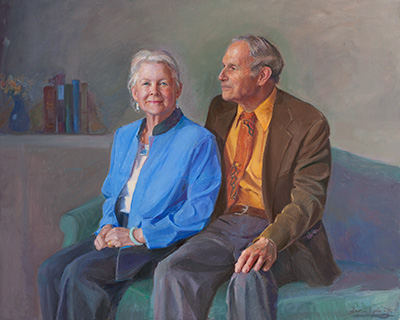Susan Pardee Baker and Timothy Danforth Baker

Susan Pardee Baker and Timothy Danforth Baker
- Artist:
- Ingrid Baldwin Egeli
- Date:
- 2010
- Medium:
- Oil on canvas
- Dimensions:
- 41.5 x 51.5 in.
Susan Pardee Baker
1930-
Baker, professor emeritus of health policy and management at the Johns Hopkins Bloomberg School of Public Health, was born in Atlanta. She earned her B.A. in zoology from Cornell University in 1951. Encouraged by her husband Timothy, a professor of international health, she earned an M.P.H. in epidemiology from the Johns Hopkins University School of Hygiene and Public Health in 1968 and joined its faculty.
Starting as a research associate, Baker rose steadily through the academic ranks, becoming assistant professor of public health administration in 1971, and associate professor of health science administration with a joint appointment in environmental health services in 1975. She was promoted to professor of health policy and management in 1983. She held joint appointments at the Johns Hopkins University School of Medicine, in the departments of pediatrics and emergency medicine.
In 1987, Baker became the first director of the Johns Hopkins Center for Injury Research and Policy. Her research studied motor vehicle occupant and pedestrian deaths among children and adults; fatalities related to aviation, motorcycles, and heavy trucks; carbon monoxide poisoning; drowning; childhood asphyxiation; house fires; falls in the elderly; homicide; suicide; and fatal occupational injuries. She is the author of Injury Fact Book and is known for developing the Injury Severity Score, a system used to assess patients with multiple injuries. She has tirelessly advocated for life-saving tools that are now commonly used, including airbags and child-safety caps.
A licensed private pilot, Baker has conducted analyses of plane crashes in the Colorado Rockies, and research on commuter aircraft crashes and on crashes of instructional flights. She served on the Armed Forces Epidemiological Board from 1996 to 2000. Baker is an ardent advocate of policy changes that will prevent injuries. Much of her teaching and research is designed to influence the legislators, administrators, media representatives, and others whose decisions can determine the likelihood of injury for thousands of people.
Baker served as vice chair of the National Academy of Science’s Committee on Trauma Research and as president of the Association for the Advancement of Automotive Medicine. Her finding that infants were at especially high risk of being killed in car crashes contributed to the passage of child passenger protection laws.
She is the recipient of numerous awards, including the 2010 Frank A. Calderone Prize, considered the preeminent award in the field, presented by the Columbia University Mailman School of Public Health. Baker also received the 1999 Award for Excellence from the American Public Health Association and has been recognized by the American Trauma Society, the Centers for Disease Control and Prevention’s National Center for Injury Prevention and Control, and the National Association of Medical Examiners. In addition, she was inducted into the Maryland Women’s Hall of Fame.
Together, the Bakers devoted a century of service to the school of public health. A portrait honoring them was unveiled in 2011 during a ceremony in their honor. In 2016, Baker was one of eight recipients of Johns Hopkins University honorary degrees.
Timothy Danforth Baker
1925-2013
Baker, a professor of international health at the Johns Hopkins Bloomberg School of Public Health, was born in Baltimore. He earned his B.A. in biology from The Johns Hopkins University in 1948, a medical degree from the University of Maryland in 1952, and a master’s degree in public health from the Johns Hopkins University School of Hygiene and Public Health in 1954.
Baker pursued advanced medical training at St. Bartholomew’s Hospital in London and at the University of Maryland Hospital before completing his residency at the New York Department of Public Health. He began his globe-trotting public health career as a district health officer in New York State, then went on to fight malaria in India and Ceylon. As assistant chief of the Health Division for the U.S. Technical Cooperation Mission (later USAID) during the 1950s, he played a key role in convincing Indian government officials to increase spending on the malaria eradication campaign.
In 1959, Baker was appointed assistant dean of the Johns Hopkins University School of Hygiene and Public Health and associate professor of public health administration. His signal accomplishments during the 1960s included co-founding the world’s first academic department of international health and founding the general preventive medicine residency program. Baker also was instrumental in building the department of international health with then-chair Carl E. Taylor and professor William Reinke. Beyond recruiting faculty and developing the curriculum, Baker helped establish one of the school’s first endowed professorships, the Edgar Berman Professorship in International Health.
Baker was a highly sought-after health systems consultant to state governments and national governments on five continents. He was a pioneer in conducting the first health workforce studies across South America as well as in Korea, Taiwan, Thailand, and Vietnam. From 1986 to 1993, Baker was founding director of the Hubert H. Humphrey Fellowship Program at the Johns Hopkins University School of Hygiene and Public Health, which trained senior foreign health professionals.
In 1993, Baker received a lifetime achievement award from the American Public Health Association, for which he served on the governing council and chaired both the epidemiology and the international health sections. He also served on the editorial boards of American Journal of Public Health, Health Services Research, Journal of Family and Community Medicine, and Maryland Medical Journal.
The portrait honoring Baker and his wife Susan was unveiled in 2011 during a ceremony in their honor at the school of public health. In 2014, the Delta Omega honorary public health society established the Dr. Timothy Baker Award for International Health Development.
"*" indicates required fields
